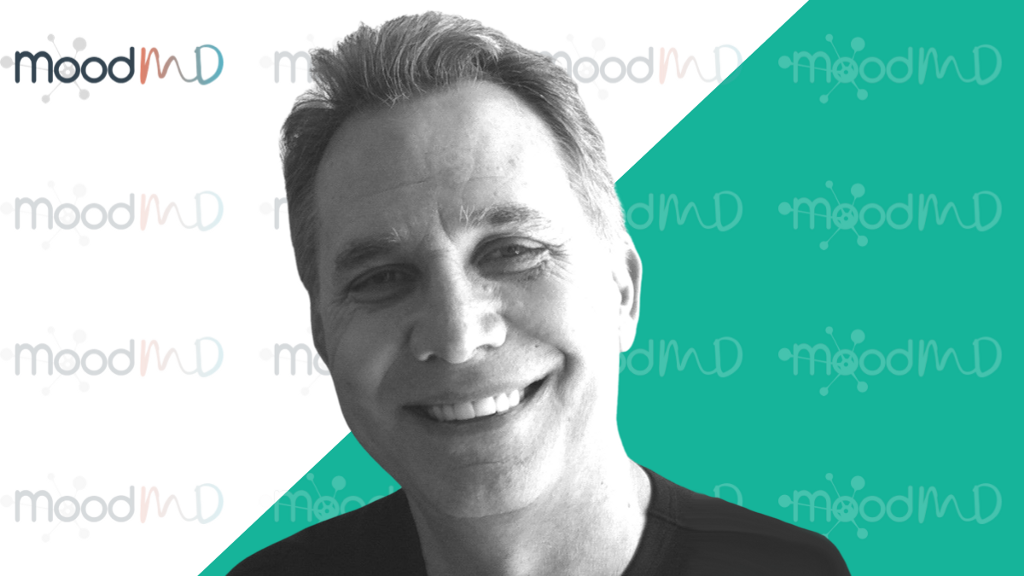Wellness
MoodMD Analyzes Biomarkers to Address Mood Disorders at the Source
Kevin Rogers set out to help veterans suffering from PTSD and discovered an entire generation with mental health concerns. His research led to the creation of a proprietary platform for discovering the biological root causes of mood disorders, so they …

Kevin Rogers set out to help veterans suffering from PTSD and discovered an entire generation with mental health concerns. His research led to the creation of a proprietary platform for discovering the biological root causes of mood disorders, so they can finally be addressed with accuracy.

Challenge
In a recent poll conducted by CNN and Kaiser Health, nine out of 10 people think we are in the midst of a mental health crisis in America. More than one in five adults describe their own mental state as only “fair,” at best. The World Health Organization reports that the global prevalence of anxiety and depression increased by 25% in the first year of the COVID-19 pandemic, and suicide is now a top ten leading cause of death in every developed country.
Mood disorders — the category of mental health dysfunctions that include chronic stress, anxiety, including the most devastating and accelerating form of anxiety, post-traumatic stress disorder (PTSD), and depression — account for a clear majority of mental health diagnoses in the United States. These disorders are comprised of a combination of body, brain, and mind anomalies, but today’s treatment, now decades old, involves only drug therapy and psychotherapy, dubbed “treatment as usual.”
The unfortunate reality in the 21st century is that treatment as usual isn’t working well. The success rate for drug therapy is about one in three, primarily because MDs are “guessing” at which prescription to write, in the absence of the mood chemistry testing that MoodMD conducts. And psychotherapy interventions vary widely between therapists who most often use outdated modalities that lag far behind new scientific data and the new levels of disorder severity now a new normal part of the 21st century mental health landscape. Thus, the success rate for therapy, the other half of treatment as usual, is only one out of two — like flipping of a coin — where half the patients are often labeled as “treatment resistant” and sidelined or sent back to their GP for a replacement medication that is still a “guess.”
This two-factor, treatment-as-usual approach doesn’t account for the myriad of other factors that impact mood — things like neuro-hormonal brain chemistry including DNA analysis; lifestyle factors like sleep, diet, exercise; and the brain’s protected pockets of neural networks — requiring “depth psychology” to access to the subconscious where traumas like PTSD / PTSS find refuge or AI to process this new volume of data into precise treatment recommendations.
Origin Story
For years Kevin Rogers witnessed, as a psychotherapist, that treatment as usual was failing more than it was helping. As a young man, he served in military intelligence in “forward areas” and witnessed the frustrating shortcomings of PTSD treatment where poor results often lead to suicide of his comrades in arms. This experience caused him to pursue a bachelor’s degree in psychology that created his desire to devote his life addressing mood disorders, particularly in the veteran community. A lifelong learner, Rogers spent years adding three graduate degrees to his educational collection following the bachelors, delving deep into every aspect of the psychological sciences. His conclusion: we needed to expand patient assessment and treatment to include a six-factor assessment set vs. the existing two-factor set that only partially assessed mood disorders.
“After all the thousands of hours spent as a psychotherapist, and years of study devoted to psychology, it was clear we weren’t doing enough to improve treatment success rates. A new, expanded paradigm needed to be architected,” explains Rogers.
Once he conceptualized the model, Rogers embarked on four years of R&D, guided by his mentor at Harvard. Prior to this, Rogers had founded and sold a unicorn-status business, affording him the time and capital to devote full attention to the mood disorder project. His obsession to assess everything and anything that could impact mood demanded a way to quickly aggregate and assess all of the relevant data points never conducted before. He worked with developer and engineer Brian Vanyo to create a sophisticated data collection and an AI model to process and distill the captured data into precision treatment recommendations. Rebecca Gleason developed the user interface and user experience model to guide patients easily through gathering the disparate mass of data and a graphical method to present recommendation results to all MoodMD patients.
Rogers asserted that the resulting site showed that “the whole really is greater than the sum of its parts. There are people who know certain aspects of the mood disorder spectrum, but no one had pieced together an entire, all-factors assessment and treatment model until MoodMD took shape.”
Under the Hood
MoodMD is a platform that delivers precision treatment for mood disorders through a comprehensive mood assessment and treatment plan that closely examines all relevant factors that can impact mood issues. The platform works as a one stop shop for patients offering a four-tiered subscription plan that provides everything from an initial, AI-driven, CBT stepwise program, to weekly or daily online access to behavioral health coaching and psychotherapists, to the ultimate combination of a full neurohormonal and genetics testing, coupled to coaching and therapy access — not offered by any other mental health treatment provider.
From a user perspective, the web program is easy to navigate starting with an all-factors, simple online data collection. The simple bio/neurochemistry data collection process comes from a patent-pending kit sent to a patient for saliva and urine collection then returned. Once all the data is received from patients, a personalized recommendations plan is presented to them online where they can view and proceed on their AI-rendered personal treatment pathway from any mobile device. They can upgrade their plan at any time to access more features, or the complete complement of services. They can also purchase from the site’s store additional testing, supplements, or additional online therapy / coaching sessions at any time.
It’s been incredibly rewarding for Rogers to see MoodMD help patients in ways the outmoded status quo could not. Take “Joe,” for example. Joe came to Rogers looking for help with his lifelong struggle with anxiety. Joe felt unfairly handicapped in life via the way his mind and body handled its often-debilitating reaction to anxiety. Rogers tested Joe in all of the ways unique to MoodMD and discovered that Joe was one of those people whose GABA (the brain’s calming agent) production-engine enzyme was misfiring because of a lack of the proper nutrients in his diet. After diet therapy and adaptogens (special supplements for the brain) Joe got a brain “reboot” and was back into balance. From there depth therapy for his subconscious-embedded faulty thinking vault finally proved effective at helping Joe neutralize the negative belief systems he had built over the years.
MoodMD is live in North America and is looking to expand into Europe in the near future. They’ve partnered with Amazon Web Services (AWS) who have provided over $2M in services to assist with website hosting, security, and the most sophisticated AI tools in the industry, which helps assemble a precise, targeted set of recommendations that are AI-improved as each week’s progress is analyzed and as each new participant is onboarded.
Another tremendous value comes in the program’s natural ability, by design, to provide all its participants with the ability to curb unhealthy consumption habits. Mood concerns cause those affected to self-medicate their mood woes with unhealthy consumption habits. By improving mood disorders the patient realizes some “head room” to change their consumption habits that, in turn, reduces the likelihood of accruing body chemistry problems that result in the dangers of manifesting one or more of the five non-communicable diseases that kill 90% of the adult populations in developed countries. This revelation led to the understanding that “all health roads lead back to the mind,” says Rogers. “If we can leverage our sophisticated model to curb mood disorders, we can also reduce the probability of contracting a non-communicable disease like heart disease or diabetes adding more weapons to the preventive healthcare struggle.” The future reality became: deal effectively with mood issues to realize better health overall.
Why We’re Proud to Invest
StartUp Health backs MoodMD’s revolutionary approach to mental healthcare because of its comprehensive, exhaustive program that provides people finely-tuned help for their mood disorders. The platform takes into account the myriad of factors that impact mood disorders and provides precision treatment, driven by their proprietary, patent-pending AI engine, MoodAi. The MoodMD system goes farther into personalized recommendations for conditions like anxiety disorders and depression than other mental wellness programs. It marries the best of medical science, with the best of psychological sciences, to produce a set of precision mood disorders treatment that impact not only mood disorders, but all areas of human health.
Given the rising numbers of people suffering from mood discomforts, and the global mental health crisis, the time is right for MoodMD. COVID-19 ushered in a new level of awareness of mental health issues and more transparency around discussing them. This exponential growth and normalization of mental health issues means that more and more people are seeking help that an overburdened medical system is ill-equipped to provide. MoodMD is well situated to provide large numbers of people with the informed, individualized care they need and to help those already in care who have experienced spirit-dulling disappointments by existing treatment models.
We’re also proud to back MoodMD because of their audacious goal to use their data to improve overall health and wellbeing for chronic diseases related to lifestyle choices and habits. Their MoodMD AI model was engineered to identify varying levels of stress, anxiety, or depression that can drive a person to self-medicate their mood concerns. With this information, doctors can provide targeted, preventative health measures — and use the MoodMD data brought in by patients to prescribe exactly the right psychotropic medication for greater success with the neurobiology of mood issues.
Join us in welcoming Kevin Rogers and the MoodMD team to the StartUp Health family!
→ Learn more and connect with the MoodMD team.
Passionate about breaking down health barriers? If you’re an entrepreneur or investor, contact us to learn how you can join our Health Equity Moonshot.
Investors: Contact us to learn how you can back Health Transformers and Health Moonshots.
Digital health entrepreneur? Don’t make the journey alone. Learn more about the StartUp Health Community and how StartUp Health invests.
Follow us on social media for daily updates on Health Transformers: Twitter, LinkedIn, Facebook, and Instagram.
MoodMD Analyzes Biomarkers to Address Mood Disorders at the Source was originally published in StartUp Health on Medium, where people are continuing the conversation by highlighting and responding to this story.
biomarkers
medical
wellness
healthcare
health
prescription
device
digital health
ai
preventative
sleep
mobile
wellbeing
therapy
research
world health organization

Lion’s Mane Mushroom: History, Benefits, and Adaptogen Properties
Explore the intriguing world of Lion’s Mane Mushroom in our comprehensive guide. Dive into its unique properties, historical significance, and myriad health…
AI can already diagnose depression better than a doctor and tell you which treatment is best
Artificial intelligence (AI) shows great promise in revolutionizing the diagnosis and treatment of depression, offering more accurate diagnoses and predicting…
Reasons You should Get this: Neptune Wellness Solutions Inc (NASDAQ:NEPT), WeTrade Group Inc. (NASDAQ:WETG)
NEPT has seen its SMA50 which is now -9.28%. In looking the SMA 200 we see that the stock has seen a -92.25%. WETG has seen its SMA50 which is …
The…













